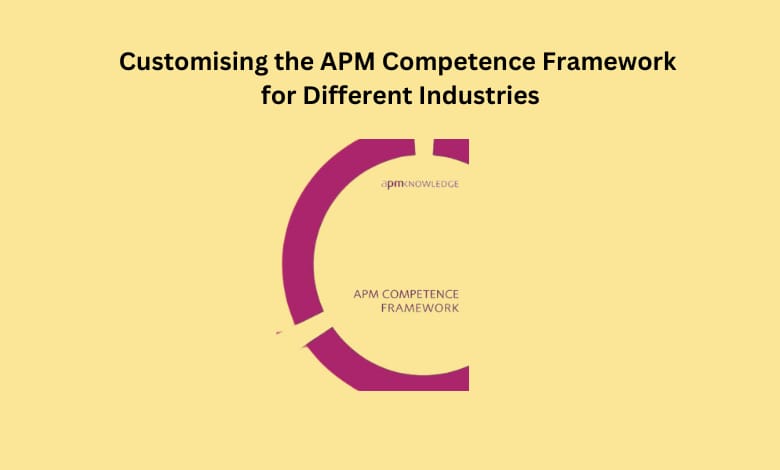Customising the APM Competence Framework for Different Industries

The foundation for acquiring outstanding project management skills is the APM Qualification combined with the APM Competence Framework. With a focus on excellence, these resources offer a methodical way to evaluate and improve the skills required for project delivery. When combined, they lay a strong basis for ongoing professional growth that guarantees project managers are prepared to handle the ever-changing demands of the complex project environments of today.
Understanding the APM Competence Framework
Many abilities grouped into several areas, including technical, behavioural, and contextual, make up the APM Competency Framework. These competencies address the abilities, information, and conduct required for efficient project management. This framework can be customised to better suit the requirements of various sectors, therefore increasing its application and significance.
Customisation for the Construction Industry
The size, complexity, and vital necessity for security and regulatory compliance characterise the construction sector. Emphasising competencies in areas like these is how the APM Competency Framework is customised for construction projects:
Health and Safety Management:
A safe workplace depends on project managers putting safety procedures into place and keeping a check on them. It involves carrying out training, safety inspections, and following safety rules to stop mishaps and safeguard employees.
Regulatory Compliance
Building codes and regulations particular to the industry must be understood and followed by project managers. For the prevention of legal problems and delays, this includes getting permissions, remaining updated on legal requirements, and making sure all project components meet these requirements.
Risk Management
Risks specific to construction, such as site hazards and material delays, should be identified and reduced by project managers. This includes determining possible problems, ranking them, and taking steps to lessen their effects so that projects are completed on time and under budget.
Technical Expertise
Project managers must have expertise of construction processes, materials, and technology. This enables them to make educated decisions, optimise project designs, and communicate effectively with stakeholders, assuring project quality and efficiency.
Customisation for the IT Industry
The IT sector is fast changing and dynamic, emphasising technological competence, agility, and innovation. Customising the APM Competence Framework for IT projects requires a focus on:
Agile Methodologies
For IT project managers to provide flexibility, ongoing improvement, and quick delivery, proficiency in agile methodologies like Scrum and Kanban is essential. These techniques support productivity, change adaptability, and process management for iterative systems.
Technical Knowledge
IT project managers must comprehend current and new technologies, software development methods, and IT infrastructure. This knowledge facilitates informed decision-making, ensuring technological feasibility and integration of novel solutions.
Stakeholder Management
Effective communication and collaboration between developers, clients, and end-users are crucial. Project managers must balance interests, negotiate requirements, and keep all parties engaged and informed to achieve aligned project goals and stakeholder satisfaction.
Change Management
Managing changes in project scope and adjusting to new technology and processes is critical. Project managers must anticipate and implement changes efficiently, ensuring project quality and timelines while keeping teams responsive and agile.
Customisation for the Healthcare Industry
The regulatory framework, emphasis on patient care, and crucial character of its projects make the healthcare sector special. Adapting the APM Competency Framework for healthcare requires improving skills in:
Regulatory Compliance
Healthcare project managers need to know about standards, laws, and accreditation requirements. They make sure all project operations follow ethical and legal standards to avoid fines and preserve the reputation of the institution and patient safety.
Quality Management
All through the project lifecycle, healthcare project managers are in charge of upholding the highest standards of patient care and safety. This is continuous observation and assessment of clinical procedures and patient results to guarantee uniform, excellent treatment.
Risk Management
Risk management done well includes recognising and reducing risks associated with clinical results, regulatory compliance, and patient safety. Risk assessments are done by project managers, who also put preventative measures in place to proactively handle possible hazards.
Interdisciplinary Collaboration
In healthcare project management, good cooperation between physicians, nurses, and administrators is essential. Teamwork and good communication are promoted by project managers, who also make sure that every team member is in line with the project objectives and can successfully contribute their experience.
Customisation for the Finance Industry
The finance sector is highly regulated and calls for strategic planning, risk management, and meticulous attention to detail. Finance project customisation of the APM Competence Framework should concentrate on:
Regulatory Compliance
Finance project managers must be well-versed in financial rules and regulations as well as compliance standards from regulatory organisations such as the SEC and FINRA. In addition to preventing legal problems, this preserves the integrity of the organisation.
Risk Management
Finding, evaluating, and reducing financial risks—market, credit, and operational—is essential. Thorough risk evaluations, strong controls, and backup plans to reduce possible negative effects are all part of effective risk management.
Strategic Planning
Projects that are in line with the financial targets and organisational plan guarantee that they advance the larger objectives of the business. To stay in line with organisational goals, this calls for strategic resource distribution, well defined project objectives, and ongoing monitoring.
Data Analysis
Analytical, forecasting, and modelling skills are prerequisites. Project managers need to understand financial information, spot patterns, and come to intelligent decisions. Good data analysis abilities enhance performance, offer insightful information, and help with strategic decision-making.
Benefits of Customising the APM Competence Framework
Customising the APM Competence Framework offers several benefits, including:
- Relevance: Ensure the framework takes care of the requirements and difficulties faced by various sectors.
- Effectiveness: By concentrating on competencies particular to the sector, improves the efficacy of project management procedures.
- Adaptability: Lets businesses modify the framework to fit shifting needs and trends in the sector.
- Professional Development: Offers project managers customised development routes to become more competent and successful professionals.
Conclusion
Customised for several industries, the APM Competence Framework is a flexible instrument that can greatly improve the efficacy of project management. Better navigation of the particular difficulties of their respective sectors by project managers concentrating on industry-specific competencies results in better project outcomes and organisational success. Adapting the framework makes sure it continues to be a useful tool for acquiring the abilities and information required for effective project management, regardless of the industry—construction, IT, healthcare, or finance.
Explore more about APM through The Knowledge Academy Courses.




